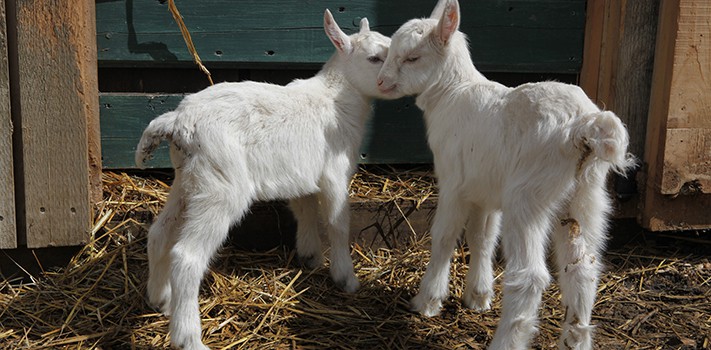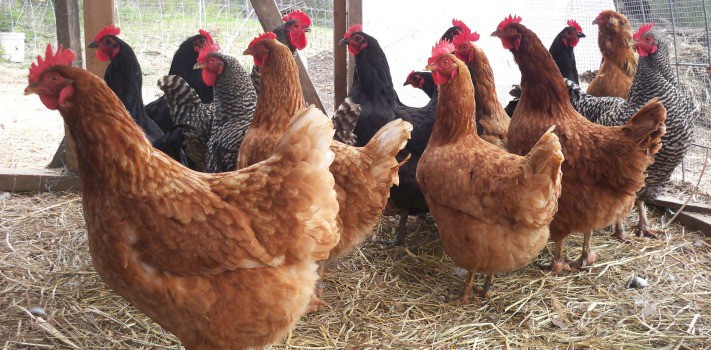There are four New Years festivals recorded in the Mishnah. You’ve probably heard of Tu B’Shvat, the new year of the trees, and Rosh HaShanah, the Jewish New Year. But did you know that Judaism has a New Year for the Animals? It’s called Rosh Hashanah La’Behemot, and it falls on Elul 1. In 2023, Rosh Hashanah La’Behemot begins the evening of Thursday, August 17 through the day of Friday, August 18.
Just as Tu B’Shvat has been revived as a Jewish Earth Day, Rosh Hashanah La’Behemot is a modern-day reminder of human relationships with animals. Animals provide humans with companionship, food, clothing and so much more. Rosh Hashanah La’Behemot is a time for us to honor our relationships with behemot, the animals in our lives.
Think of the chicken on your Shabbat dinner table, the milk in your coffee, or the leather in your sneakers. Ask yourself: How do animals impact your life? What are your relationships with animals? If you start paying attention to the products you rely on every day, you will see how much you rely on domesticated animals. There are plenty of reasons to celebrate animals on Rosh Hashanah La’Behemot!
Rosh Hodesh Elul, the new moon festival of the month of Elul, marks the day for ma’aser behema, or the counting of domesticated animals, such as cattle and sheep, for tax purposes. During the time of the Temple, this day was the new year to determine the start date of animal tithes.
When the Temple stood, Rosh Hashanah La’Behemot celebrated one way people honored the domesticated animals that allowed people to survive. Rosh Hashanah La’Behemot parallels the more well-known Rosh Hashanah L’llanot (Tu B’shvat), the New Year’s Festival that marked the day for tithing fruit bearing trees.
Rosh Hashanah La’Behemot points to the connection with domesticated animals. “Domesticated animals” include all those historically bred by humans, whether they are kosher or non-kosher, such as cats, dogs, cattle, chickens, pigs, llamas, and goats. Today, animals are indirectly affected by humans in ways our ancestors couldn’t imagine. Human activities like factory farming and deforestation lead to habitat loss and decreases in biodiversity. Even animals we don’t directly interact with are being impacted by human activity.
Use this day to consider the deep relationship between humans and animals of all kinds. The holiday can serve as a chance to remind people tza’ar ba’alei hayim, the prohibition against unnecessary cruelty to animals. Rosh Hashanah La’Behemot is a perfect day to start conversations about animal welfare — and start taking action to improve the lives of animals around the world.
Rosh Hashanah La’Behemot has not been celebrated extensively since Temple times. There is room for creativity and interpretation in adapting this ancient holiday to address modern issues. Questions? Ideas about how to celebrate? Contact us at foodeducation@hazon.org.
Rosh Hashanah La’Behemot Programs:
- Shofar- Blowing Ceremony: All-ages ceremony to bless the animals in our lives.
- The Council of All Beings: This 1-2 hour activity encourages children to explore their natural ecosystems and imagine themselves coming together as a council of animals.
- Rosh Hashanah La’Behemot: Explanation and Ritual
- Two Shofar Rituals for the New Year of Elul
- A Blessing for Bugs on Rosh Hashanah La’Behemot
- Host a Vegan Shabbat Dinner: Host a vegan Shabbat Dinner on Rosh Hashanah LaBehma. Provide plant-based meat alternatives to show people high welfare options are available and delicious. If children are present, shape the food like animals to make the dinner more interactive. During the meal, hold a guided discussion regarding the connection of Jewish values to animal welfare. Discuss how the way in which animals are treated today within the food industry may not align with Jewish ideals.
- Commit to buying higher-welfare animal products: Take our online commitment to buying higher-welfare eggs, and download the Food Guide to learn more.
Animal Connection Programs:
- The Ark Project: This b’nai mitzvah curriculum from the Jewish Initiative for Animals contains a wealth of activities to explore human-animal relationships.
- Min Ha’Aretz: Making meaning from our food: This curriculum includes texts, Jewish quotes, and questions that allow children to explore their relationship with animals in a Jewish context.
- Meat Reduction Rap: This fun activity allows for a creative way to explore the environmental effects of eating meat, specifically beef.
- Fur and Feather Together: A picture book about animals and people across the globe standing together against climate change.
Articles
- Three articles about restoring the ancient New Year for Animals by Richard Schwartz
- Rosh Chodesh Elul: The New Year for the Animals by Aharon Varady (Open Siddur)
- Explanation and ritual for the New Year’s Day for Domesticated Animals by Aharon Varady (Open Siddur)
- Why Animals Need their Own New Year by Rabbi Jonathan Wittenberg (The Jewish Chronicle)
- A New Year for the Animals: The Time Has Come by Jeffrey Cohan (The Forward)
- A New Year’s Resolution to Be Proud Of (That You Actually Can Keep!) by Joshua Ratner (My Jewish Learning)
- What is Our Responsibility to Other Creatures? A Jewish Perspective on Animal Suffering and Conservation by Rabbi Simcha Feuerman (My Jewish Learning)
- Happy New Year… for the Animals? by Natalie Warhit (The Forward)
- Rosh Hashanah La Behemot Teach-In video featuring 15 guest educators
Jewish Organizations Promoting Animal Welfare
- Jewish Initiative For Animals (JIFA): provides new ways for the Jewish community to bring its values of compassion for animals into practice and build Jewish community in the process.
- Shamayim V’Aretz Institute: Jewish animal welfare organization that educates leaders, trains advocates, and leads campaigns for the ethical treatment of animals
- Jewish Veg: encourages and helps Jews embrace plant-based diets as an expression of the Jewish values of compassion for animals, concern for health, and care for the environment.





